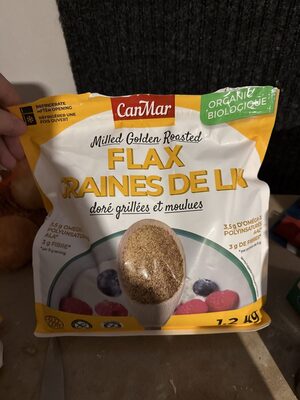
Barcode: 871329005010
Graine de lin
HALAL
📝 Reason: The single ingredient in this product is milled golden roasted flaxseed. Based on ingredient name, it is a pure plant-based seed – not an animal derivative nor does it contain any E-codes that are potentially Haram or Doubtful. Such plant-based foods are Halal unless contaminated. Refer to Quran 5:3 and various Halal certifier guidelines (e.g., IFANCA, HMC) for plant foods.
🏷️ Category: Plant Based Foods And Beverages, Plant Based Foods, Cereals And Potatoes, Seeds, Cereals And Their Products, Cereal Grains, Flax Seeds
📄 Certificates: No Gluten, Kosher, No Peanuts, Vegetarisch, Vegan
Ingredients:
Details
Understanding the Halal Status of Graine de lin
When it comes to dietary choices, the importance of Halal products cannot be overstated, particularly for those who adhere to Islamic dietary laws. Graine de lin, popularly known as milled golden roasted flaxseed, has recently gained attention, and many consumers may wonder—Is Graine de lin Halal? In this detailed analysis, we will explore the Halal status of Graine de lin, breaking down its ingredients, understanding E-numbers, and contextualizing it within the framework of Halal certifications.
Ingredients: What’s Inside Graine de lin?
The only ingredient present in Graine de lin is milled golden roasted flaxseed. Flaxseed is known for its rich nutritional profile, packed with omega-3 fatty acids, fiber, and various essential nutrients. Notably, it is a pure plant-based seed, meaning it does not originate from any animal sources, aligning perfectly with Halal dietary requirements.
Reasons for Its Halal Status
The classification of Graine de lin as Halal stems from several considerations:
- Plant-Based Nature: As a plant-derived food, flaxseed inherently meets the criteria outlined in various Islamic texts regarding Halal food consumption. The Quran (5:3) refers to the necessity of consuming pure and lawful items, making this product align with those guidelines.
- Absence of E-Codes: Graine de lin does not include any additives or E-codes that could potentially render it Harām (forbidden) or doubtful. This is essential, as many processed foods may contain E-numbers that provoke scrutiny among Halal consumers.
- Recommended by Certifiers: Respected Halal certifying bodies, like IFANCA and HMC, reinforce the view that plant-based foods such as flaxseed are typically Halal unless there is contamination or processing with doubtful substances.
Breaking Down the E-Numbers and Their Status
In evaluating the Halal status of any food item, understanding its E-numbers or additives is crucial. In the case of Graine de lin, there are no E-codes linked to its composition. The lack of additives suggests a clean processing line, free from any risks of cross-contamination with non-Halal substances. Additionally, sources such as FoodChemAdditives and HMC verify that flaxseed is naturally Halal, further affirms its acceptable status.
Halal Certifications and Other Considerations
While Graine de lin does not carry a specific Halal certification, the absence of gluten, peanuts, and any animal by-products enhances its appeal to those seeking plant-based, vegan, or vegetarian options. As a part of the category of Plant-Based Foods and Beverages, it falls under several other classifications, including cereals and seeds, showcasing its versatility in various diets.
This product is also endorsed as Kosher, Gluten-Free, and Vegan, making it a great option for those with dietary restrictions or lifestyle choices outside of Islamic dietary laws.
Conclusion
In summary, Graine de lin stands out as a Halal product based on its simple, plant-based composition. Consumers can feel confident in choosing this flaxseed for their dietary needs, knowing it aligns with Halal guidelines and has been recognized as clean and safe. Many individuals who pursue Halal options in their diet can integrate Graine de lin into their meals without hesitation. This unique seed not only enriches diets with essential nutrients but also adheres to the valuable principles of Halal consumption.
